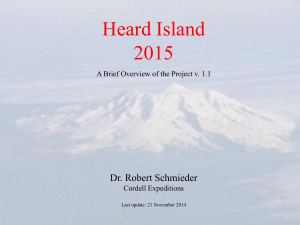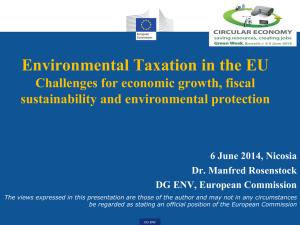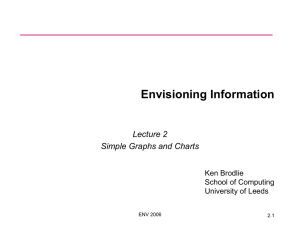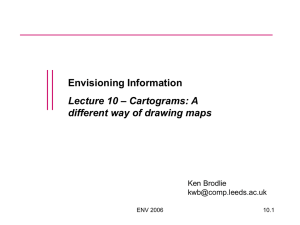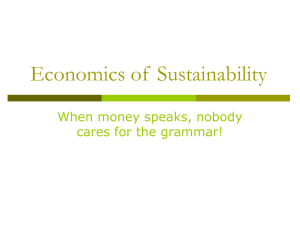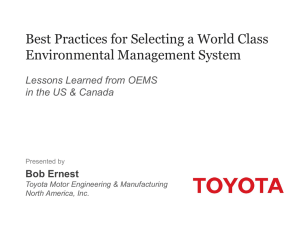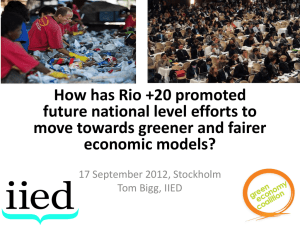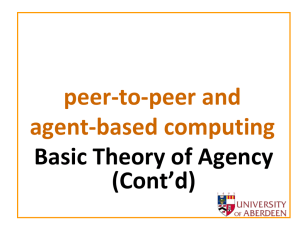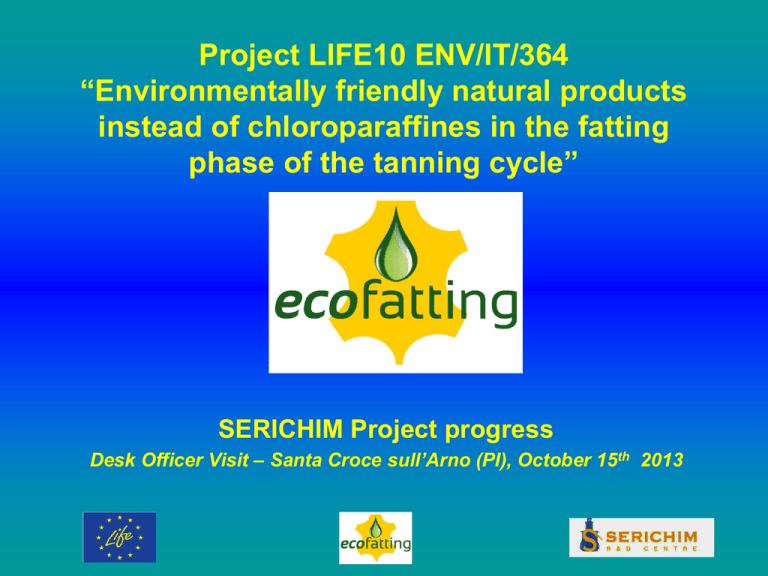
Project LIFE10 ENV/IT/364
“Environmentally friendly natural products
instead of chloroparaffines in the fatting
phase of the tanning cycle”
SERICHIM Project progress
Desk Officer Visit – Santa Croce sull’Arno (PI), October 15th 2013
Target of the project
Replacing well performing traditional fatliquoring agents as
Cl
Cl
CH2 CH2 CH CH CH2 CH2 CH3
CH CH2 CH2 CH CH CH2
H3C
Cl
Cl
Cl
Chlorinated paraffins
Cl
Cl
CH2 CH2 CH CH CH2 CH2 CH3
CH CH2 CH2 CH CH CH2
H3C
O S O
Cl
Cl
Cl
Sulpho Chlorinated paraffins
Target of the project
with chlorinated natural substrates as :
Cl
Cl
O
CH3
CH2 CH2 CH CH CH2 C
CH CH2 CH2 CH CH O
H3C
Cl
Cl
Cl
Chlorinated fatty acid methyl esters (C12-C18)
Cl
Cl
O
CH3
CH2 CH2 CH CH CH2 C
CH CH2 CH2 CH CH O
H3C
O S O
Cl
Cl
Cl
Sulfochlorinated fatty acid methyl esters (C12-C18)
Project LIFE10 ENV/IT/364
• Chlorinated paraffins are used as greasing agents in
the finishing working step in leather manufacturing,
in order to provide an oily and soft “touch “ to the
leather.
• Sulpho Chlorinated paraffins are sometimes used as
direct tanning agents, but in the majority of cases are
subjected to a further saponification reaction, in
order to be used as emulsifiable greasing agent.
Project LIFE10 ENV/IT/364
Chlorinated paraffin selected as benchmark :
CLOPARIN 44F (2,0 kg samples provided to partners on March 2012)
Parameters
Units
Specification
Results
Anal. Meth.
Clear liquid
Clear liquid
visual
Hazen
0-150
125
Density at 25 °C
g/L
1160-1175
1168
Chlorine content
% m/m
44,5-46,5
45,2
Cinemat. viscosity at 25 °C
cSt
150-240
214
Cinemat. viscosity at 40 °C
cSt
60-90
76
ASTM
D 2108-85
ASTM
D 4052-91
ASTM
E 256-88
ASTM
D 445-82
ASTM
D 445-82
% HCl
< 0,15
< 0,15
IND2013
Aspect
Colour
Thermal stability Index
(4h a 175 °C)
Project LIFE10 ENV/IT/364
Sulpho chlorinated paraffin selected as benchmark :
CLOPARTEN Z (2,0 kg samples provided to partners on March 2012)
Parameters
Units
Specification
Results
Anal. Meth.
Clear liquid
Clear liquid
visual
Hazen
0-200
40
Density at 25 °C
g/L
1035-1055
1050
Chlorine content
% m/m
29-31
30,5
ASTM
D 2108-85
ASTM
D 4052-91
ASTM
E 256-88
Sulfur content
% m/m
2,7-3,2
3,1
IND2047
Aspect
Colour
Project LIFE10 ENV/IT/364
ACTION 3 – 4
• Selection, preparation and evaluation of natural based
Chlorinated and Sulpho chlorinated products
• A set of derivatives from natural products were
selected as best candidates. Selection criteria was
based on a carbon chain lenght C12 – C18 and chlorine
and sulphur content approaching the benchmark
products Chloparin 44F and Chloparten Z
Project LIFE10 ENV/IT/364
The following natural based substrates were
considered:
A ) METHYL STEARATE
B ) FATTY ACID METHYL ESTERS (SATURATED) MIXTURE
C) FATTY ACID CHLORIDES MIXTURE
D) PALMKERNEL OIL FATTY ACID METHYL ESTERS
Project LIFE10 ENV/IT/364
In order to proceed with the preparation of samples
for application tests up to kilograms scale, a
specifically
designed equipment for photochlorination was set up in SERICHIM labs.
Project LIFE10 ENV/IT/364
SERICHIM photochlorination lab equipment
Project LIFE10 ENV/IT/364
A nitrogen flow purges the
reactor to remove residual
oxygen
Substrate to be
chlorinated
is
charged into the
jacketed – stirred
glass reactor
A thermostatic bath keeps
temperature at 60 °C
Project LIFE10 ENV/IT/364
UV lamp is switched ON
to irradiate the substrate
Off gases are analyzed
for residual chlorine
content …
… and then adsorbed
in basic aqueous
solutions
Gaseous chlorine is allowed to flow
from tank to reactor, bubbling into the
substrate through a glass septum
Project LIFE10 ENV/IT/364
When desired chlorine content (and
sulfur content if it is) is reached,
reactant gas flows are stopped and UV
lamp switched off
If sulfo chlorinated product is to be
achieved, a SO2 flow is feed to the
reactor through a separated line
Project LIFE10 ENV/IT/364
A nitrogen flow purges
the chlorinated product
from residual gases (Cl2,
HCl and SO2)
Chlorinated product is
admixed with stabilizer,
cooled and packed
Project LIFE10 ENV/IT/364
Since July to December 2012 the following samples were
prepared and delivered to project partners:
A ) CHLORINATED METHYL STEARATE :
.
Four chlorinated methyl stearate samples at different
chlorination degree were produced:
Lot 120710B (21,3 % m/m Chlorine content - 0,20 kg)
Lot 120710D (37,9 % m/m Chlorine content - 0,20 kg)
Lot 120712 (34,4 % m/m Chlorine content - 0,20 kg; viscosity
and density as for Cloparin 44F)
Lot 120907 (45,2 % m/m Chlorine content - 0,60 kg;
chlorine content as for Cloparin 44F)
Project LIFE10 ENV/IT/364
B ) SULFO CHLORINATED METHYL STEARATE :
Lot 120925 (8,6% m/m sulfur content - 1,50 kg)
C) CHLORINATED FAME (SATURATED) MIXTURE :
A synthetic mixture of methyl esters of fatty acids
(lauric, myristic, palmitic and stearic) was prepared,
simulating the acid composition of Palmkernel oil.
Stearic was present as satured substitude of oleic acid.
Lot 120903 (40,5 % m/m Chlorine content - 2,80 kg)
Project LIFE10 ENV/IT/364
D ) CHLORINATED PALMKERNEL OIL FAME:
Lot 130116 (47,5 % m/m Chlorine content - 2,00 kg)
E) SULFO CHLORINATED PALMKERNEL OIL FAME :
Lot 130118 (8,2% m/m sulfur content - 2,20 kg)
These last two preparations have allowed to test the
influence of chlorinated unsaturated FAME present into
natural raw material on fatting agent properties.
Project LIFE10 ENV/IT/364
The natural based substrate considered was a mixture of
PALMKERNEL OIL FATTY ACID METHYL ESTERS
which typical composition is:
Component
Capric acid (C10) Methyl ester
Lauric acid (C12) Methyl ester
Myristic acid (C14) Methyl ester
Palmitic acid (C16) Methyl ester
Oleic acid (C18:) Methyl ester
Weight
% m/m
0 - 3,0
54,0 - 59,0
17,0 - 21,0
8,0 – 11,0
9,0 - 17,0
Project LIFE10 ENV/IT/364
ACTION 5 :
• Fatting at a semi-industrial level by using natural
products
ROLE of SERICHIM :
• Preparation of samples of Chlorinated and
Sulphochlorinated FAME at “few kilograms scale” to
make available to project partners
Project LIFE10 ENV/IT/364
In order to proceed with the preparation of
samples for semi-industrial application tests up
to “few kilograms scale”,
the previous
photochlorination kilolab plant was replaced
with a larger one.
Project LIFE10 ENV/IT/364
Kilolab photochlorination plant
Pilot photochlorination plant
Project LIFE10 ENV/IT/364
Since January to June 2013 the following samples were
prepared and delivered to project partners:
A ) CHLORINATED PALMKERNEL OIL FAME:
Sent to
Density
at 25 °C
(g/L)
Viscosity
at 25 °C
(cSt)
Viscosity
at 40 °C
(cSt)
Chlorine
content
(%m/m)
Test
report
2,0
COLORTEX
1287
1849
355
47,5
2013/002
130422
2,7
INESCOP
1319
3316
684
48,6
2013/012
130520
7,2
COLORTEX
1306
2914
548
48,2
2013/017
130529
7,7
INESCOP
1302
2869
546
48,1
2013/018
Lot no:
Quantity
(kg)
130116
Project LIFE10 ENV/IT/364
B) SULFO CHLORINATED PALMKERNEL OIL FAME :
Sent to
Density
at 25 °C
(g/L)
Chlorine
content
(%m/m)
Sulfur
content
(%m/m)
Test
report
2,2
COLORTEX
1161
24,1
8,2
2013/003
130404
1,0
COLORTEX
1317
38,0
8,6
2013/007
130520
1,8
INESCOP
1317
38,0
8,6
2013/007
Cloparten
10-15
2,2
INESCOP
1055
16,5
10
n.a.
130604
7,6
COLORTEX
1334
39,0
8,6
2013/020
130611
7,5
INESCOP
1334
39,2
8,0
2013/021
Lot no:
Quantity
(kg)
130118
Project LIFE10 ENV/IT/364
Cost evaluation for natural fatting agents:
Price* for CLOPARIN 44F:
Price* for CLOPARTEN Z:
1,05 €/kg
1,35 €/kg
* (data from COLORTEX)
Price for C14 C17 paraffin:
Price for natural raw material #:
#(data
1,31 €/kg
1,42 €/kg
from GAMMA CHIMICA for Palmere M1218 PK)
Estimated final price for new tanning agents from natural source:
CHLORIN. PALM KERNEL FAME:
1,12 €/kg
SULFO CHLORIN. PALM KERNEL FAME:
1,23 €/kg
Project LIFE10 ENV/IT/364
Project LIFE10 ENV/IT/364
Alternative raw material to palm kernel oil :
Fleshing is a typical by-product from tannery process
and it is treated as a waste (they pay for disposal).
Fleshing contains 10-15 % of fat as triglycerides.
Industrial processes use fleshing for protein hydrolizate
recovering, obtaining as by-product a sterile fat,
containing up 10-20% of free fatty acid.
This fat, due to the high free fatty acid content, has
poor commercial value (ca. 0,15-0,25 €/kg)
Project LIFE10 ENV/IT/364
Alternative raw material to palm kernel oil :
SERICHIM is owner of DeACIDO technology, a process
developed in 2008 for using high acidity animal fats
and vegetable oils as raw materials for biodiesel,
making them an ethical alternative to food sources for
this production.
The DeACIDO technology applies to the esterification of
free fatty acids (FFA) present in fats and oils: it
represents a first section of the triglycerides
transesterification process with methanol to produce
Fatty Acid Methyl Esters (FAME) and glycerol.
Project LIFE10 ENV/IT/364
ACID FAT
CATALYST
DeACIDO process
flow sheet
METHANOL
MAKE UP
WASTE
FAME
GLYCEROL
Project LIFE10 ENV/IT/364
O
R
O
R
2
O
O
O
O
O
R
R
1
+ H3C OH
acid
O
+ H2O
R
O CH3
OH
First step : fatty acid esterification
Project LIFE10 ENV/IT/364
O
R
O
R
2
O
O
O
R
HO
1
+ H3C OH
O
O
base
X
R
O
+
O CH3
HO
OH
R
O CH3
Second step : triglycerides transesterification
Project LIFE10 ENV/IT/364
Alternative raw material to palm kernel oil :
The DeAcido process core consists of two phases
esterification reaction, at the end of which the acid
catalyst is removed by means of an easy decanting
operation. At this stage other polar components
present in the oil (phospholipids, glycolipids, etc) are
removed with the polar phase, obtaining
deacidification and degumming in a single stage,
allowing use of fats and oils of very poor quality as
raw materials for FAME preparation.
Project LIFE10 ENV/IT/364
New costs evaluation :
FAME mixtures obtained from DeACIDO technology
have an industrial price of 0,90-1,00 €/kg.
Using this alternative raw material, estimated final price for
new tanning agents from natural source are:
CHLORIN. FAME from ACID FATS:
0,91 €/kg
SULFO CHLORIN. FAME from ACID FATS :
1,02 €/kg
Price* for CLOPARIN 44F:
Price* for CLOPARTEN Z:
1,05 €/kg
1,35 €/kg
* (data from COLORTEX)
Giulio Puntin
Alfonso Nardelli
Thanks
for your
attention !
Vera Nocent
Giusi Vassallo

